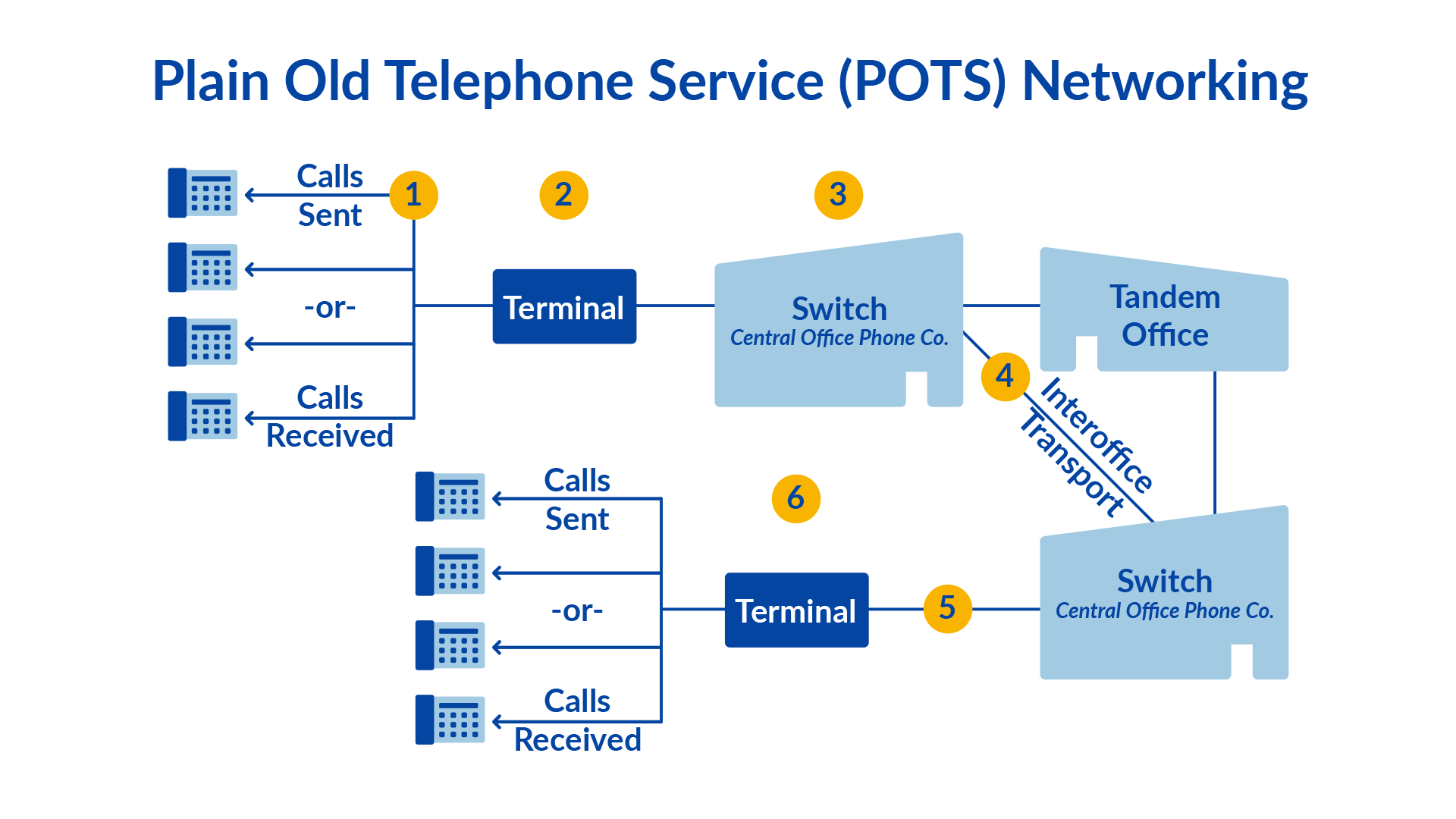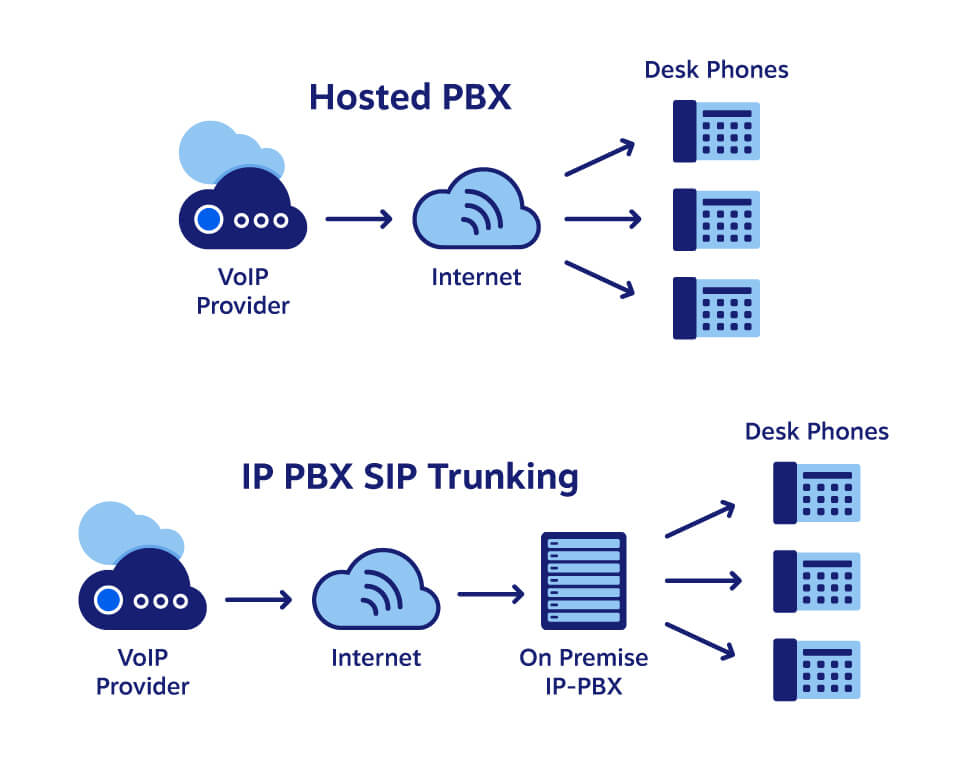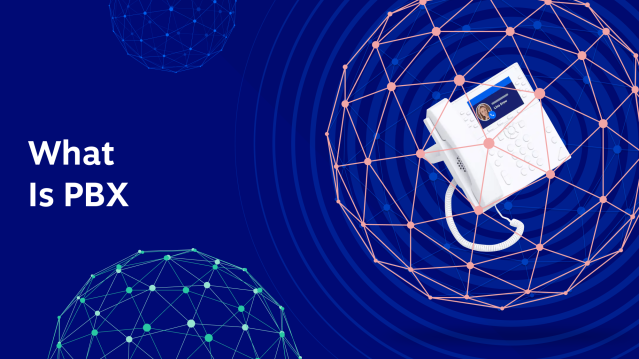As your company expands from a startup to a thriving business, you’ll want to provide phone connectivity to your staff. You’ll likely find yourself researching Private Branch Exchange (PBX) systems to do this.
This guide breaks down all the essentials you need to know about modern PBX solutions. Even if you’ve never managed a PBX before, you can jump around to the parts that matter to you.
What Is a PBX?
A PBX is short for Private Branch Exchange, an internal telephone network allowing users to talk to each other. It’s responsible for phone features like inbound and outbound calls, call forwarding, voicemail, and more.
PBXs consist of various hardware components to provide voice connectivity to the public telephone network. They operate a company’s private telephone network and relay calls to the outside world, including routing and advanced calling features for inbound and outbound calls.
Setting up a PBX is no small task. A company enlists the help of one or more systems administrators with decades of telecom experience. You’d also need the physical space to place the PBX system in the office, like a closet or server room.
To better appreciate the features and benefits of a commercial-grade PBX, we must first talk about the phone system.
Future-proof your company's PBX.
Experience superior call quality and lower costs with Nextiva. Works with dozens of PBX systems.
Setting Up Your Telephone Network With a PBX

The traditional telephone system is known as the Plain Old Telephone Service or POTS for short. It’s based on the twisted pair of wires from the local phone company to the building. POTS is basic, reliable, and hasn’t changed much in 140 years.
Telephone service providers connect calls with others using the Publicly Switched Telephone Network (PTSN) on the Integrated Services Digital Network (ISDN) protocol. The PSTN makes it possible for a Verizon customer to call an AT&T customer as well as patch calls over locally.
Providing a business with phone service can be expensive. A typical traditional business phone bill can easily be in the thousands every month just for a hundred lines.
There has to be a better way.
PBXs allow a business to run an internal phone system and use fewer phone lines from the phone company.
Top PBX systems can manage voicemail, auto attendants, and recorded messages. This also includes phone extensions for everyone in the company.
PBX analogy: computer networks
You might have heard long ago that the internet was running out of IP addresses. To solve this predicament, someone would use a router within an office to assign internal addresses to each device.
All those devices would then share the same IP address when interacting with the outside world. Home and business routers have effectively eliminated the concern of running out of IPs and added more security.
The same approach applies to a Private Branch Exchange. It’s a phone network that serves employees but shares the same outbound channel when they dial out. Internally, employees can use any phone extension, but they share a finite set of business phone numbers externally.
A modern alternative
Cloud-based PBX has redesigned how businesses handle phone calls, offering a significant upgrade to past limitations. Before, PBXs were proprietary and very difficult to maintain.
Today, PBX systems have evolved quite a bit.
No longer beholden to the local telephone company, calls are made using Voice over Internet Protocol (VoIP) technology. Instead of analog lines, SIP trunking can establish connectivity for a fraction of the cost.
The purpose of a PBX
The primary purpose of a PBX is to serve as a business phone system.
It allows for the internal management of phone calls within a smaller area, such as an office or business. A PBX can handle features like voicemail, auto attendants, and recorded messages, providing a comprehensive phone system for the organization.
In contrast, the PSTN is a public phone network that connects calls between different providers and handles the routing of calls on a larger scale. It’s not specifically designed for internal business phone systems like a PBX.
PBX systems empower IT leaders to maintain their existing devices with an all-digital backbone by assigning different business phone numbers to different extensions. Alternatively, a cloud PBX blends the best of both worlds with a fully managed phone system deployment.
Now that we know the purpose of a Private Branch Exchange, let’s learn about the benefits of a modern PBX for business communications.
PBX System Benefits for Businesses
It’s not every day that businesses specifically want to set up their phone system. There has to be something in it for them to move their phone service to the cloud.
Companies large and small enjoy the impressive capabilities of a PBX. Here are the top reasons why businesses use a PBX:
- Call management – Manage and complete calls on a pre-programmed schedule. For example, a medical office could route after-hours calls to an answering service. Operators can restrict or permit international dialing as needed to avoid high costs.
- Call transfer – Easily transfer calls between users and departments without dropping the call. This is especially useful for customer support and sales teams.
- Custom greetings – Record customized greetings and hold music to create a professional image and alert customers to promotions or issues.
- Call centers – PBX systems enable call center functionality to manage inbound/outbound calls and distribute them to agents. A cloud PBX can scale to handle high call volumes.
- Multi-location connectivity – Connect multiple offices on the same phone system so employees can communicate seamlessly across locations.
- Reporting & analytics – Many modern PBX systems provide detailed reporting on call activity, agent performance, and more. This data helps businesses optimize their communications.
- Unified communications – A PBX can integrate with other communication channels like video conferencing, chat, and email to provide a seamless user experience.
- Cost savings – VoIP-based PBX systems can significantly reduce costs compared to traditional phone lines. Businesses only need an internet connection instead of a separate voice infrastructure.
Today, companies aim to configure their PBX as a cloud phone system with managed PBX features across many locations and users. This approach allows for the most flexibility at an affordable price.
Related: 4 Better (and Easier) FreePBX Alternatives
Types of PBX Phone Systems

PBX phone systems exist in a few varieties to fit just about any business need thrown at it. As business applications have migrated to the cloud, so have PBXs.
Here’s a comparison table of hosted PBX vs. on-premise PBX systems:
| Feature | Hosted PBX | On-Premise PBX |
|---|---|---|
| Upfront costs | Low, pay-as-you-go model | High, large capital investment |
| Ongoing costs | Predictable monthly fee | Unpredictable maintenance/upgrade costs |
| Scalability | Easily add lines & features | Requires more PBX equipment/wiring |
| Mobility | Supports remote work | Limited or no mobile functionality |
| Integrations | Integrate with CRM, apps | Limited integration options |
| Technology | Modern VoIP/cloud-based | Aging digital/analog |
| IT support | 24/7 vendor handles | In-house IT team |
| Disaster recovery | Built-in failover & redundancy | Requires manual backup/restoration |
| Security | Vendor adheres to strict standards | Risk of unsecured physical access |
| Future-proofing | Automatic updates & new features | The vendor adheres to strict standards |
Comparing on-premises and hosted PBX systems can help you make the right choice for your business. Whether you’re researching PBX systems for yourself or a client, you can recognize the benefits at a glance.
For startups, small businesses, and enterprises in 2024 and beyond, a hosted PBX is the preferred way to set up phone service for your company. You’ll save yourself a ton of stress and budget.
There are a few options to consider for your PBX: hosted, on-premises, and hybrid.
1. Hosted PBX
A hosted PBX, also called a cloud PBX, virtual PBX, or IP PBX, is often included as part of a unified communications platform that lets you connect and route internal and outside lines in a single system.
With a hosted PBX system, you can manage your employee’s phones from your web browser.
Because it’s hosted in the cloud instead of on a physical server, almost any device anywhere in the world with an internet connection can use the system, including computers, cell phones, and IP phones.
Most modern IP PBX systems offer additional features you won’t find with landline systems. You can adjust PBX features like call transfer, call recording, voicemail transcription, call routing, auto attendants, interactive voice response (IVR), hold music, call forwarding, and more from an online portal.
For example, a VoIP PBX can connect to your business’s CRM software, route incoming calls to cell phones, handle large conference calls, and integrate with other communication channels like SMS or video conferencing.
Even better, a cloud-based PBX is more cost-effective than an on-premise system. Its features are updated regularly, and you won’t need to spend time setting up and maintaining the network infrastructure.
Hosted PBX providers typically charge a monthly per-user fee that includes minutes, features, and support. Some also offer metered plans that charge based on usage. Either way, costs are more predictable than with a traditional PBX.
2. On-premises PBX systems
An on-premises PBX is an in-house communication system for handling incoming and outgoing calls. It’s the traditional method that’s been used for generations and is essentially an automatic version of the manual switchboard.
On-premise PBX systems require an on-site server and manual wiring to each business phone. This results in a relatively high upfront cost of around $1,000 per line, plus ongoing occasional maintenance (consulting) fees. Costs can quickly add up, especially for larger companies.
On-premise PBX systems were once the only option, but today they’re limited and cost-prohibitive for most businesses.
The underlying technology PBX systems were built on—landlines—is becoming less relevant each year. A traditional PBX system lacks many of the advanced features you’ll have with a modern business telephone system.
They’re also more vulnerable to security threats.
According to the FCC, some phone scams target innocent staff using legacy PBX systems to relay expensive international calls. On-prem systems are only as secure as the physical location they reside in.
As a business owner, you want to ask yourself, “Does our PBX yield the most value every year? Are we spending too much managing it?” Regarding depreciating assets, on-prem PBX systems are costly to maintain, scale, and configure.
3. Hybrid PBX
A hybrid PBX adapts an on-premise PBX system for use with Voice over IP telephony.
It uses SIP trunking technology to provide voice service for your company’s PBX system. This multi-channel voice service is available without changing other PBX features.
As your company grows, you add more channels without needing to install the wiring an on-premise system requires.
Setting up a hybrid PBX with a top-rated SIP trunk provider is a worthy option for companies that can’t afford a complete overhaul. It provides your PBX with new scalability and lower communication costs with the same hardware.
Despite these benefits, however, hybrid systems are still limited by the requirements of an on-premise PBX.
They require upfront setup, server space, and ongoing IT maintenance costs. While it’s a good option for transitioning a legacy system to VoIP technology, few businesses would benefit from installing a new hybrid system.
Choosing the Right PBX System for Your Business
When choosing a PBX system, consider the following factors:
- Current setup – If you have an existing on-premise PBX, a hybrid system may make sense as a transitional step. If starting from scratch, a hosted PBX is likely the best choice.
- Budget – Hosted PBX systems have lower upfront costs and predictable monthly fees. On-premise systems require a large initial investment. Consider both short-term and long-term costs.
- Company size – Hosted PBX systems scale easily as your company grows by simply adding lines. Traditional PBX systems are harder to expand. Select a system that can handle your expected growth.
- IT resources – With a hosted PBX, the provider handles maintenance and support. On-premise systems require in-house IT expertise. Factor in staffing costs and time.
- Needed features – Cloud PBX systems offer advanced features like CRM integration and mobile apps. Legacy systems are more limited in functionality. Evaluate which features are must-haves for your team.
- Reliability – A PBX system should have built-in redundancy to maintain uptime. Cloud systems generally offer better disaster recovery than on-prem options. Consider a provider’s service level agreement (SLA).
- Security – Hosted PBX providers adhere to strict security standards like HIPAA and PCI DSS. On-premise systems are only as secure as your internal protocols. Don’t overlook this critical factor.
- Customer support – Choose a PBX provider with 24/7 customer support to quickly resolve any issues that arise. Test out support channels before committing.
- Future plans – Consider not just your current needs but where your business is headed. A flexible, cloud-based PBX system will be easier to adapt as technology evolves.
For most modern businesses, especially those with remote or hybrid workforces, a hosted PBX system will provide the greatest flexibility, cost savings, and ease of use.
However, companies with specific security requirements or existing infrastructure may still opt for an on-site or hybrid setup.
Adapt a PBX to Your Company — Not the Other Way Around
No matter what PBX you choose, you should strive to make sure it meets your company’s needs. The way we work has changed so much in two decades. Shouldn’t your PBX keep up with you?
One of the fundamental takeaways here is that you can’t only decide based on the sticker price of a business phone system. Ensure you consider the uses, limits, and flexibility in overall communication features.
Assess your company’s growth trajectory and range of internal and external communications. No one knows your business better than you do.
PBX Phone System FAQs
Here are some more things to know about PBX.
PBX refers to the private telephone network within a company. VoIP (Voice over Internet Protocol) is the technology that allows voice communications over the internet. A PBX system can use either traditional phone lines or VoIP to connect calls.
Costs vary depending on the type of system and number of users. Generally, you can expect to pay $500-$1000 per user for an on-premise PBX system, plus ongoing maintenance costs. Hosted PBX systems are typically charged a monthly per-user fee, ranging from $20-$50 per month.
The call plan pricing may vary depending on the provider.
PBX phone systems are a good fit for small businesses that handle many calls and require only a few calling features to work reliably. According to a survey by Software Advice, companies that use a cloud PBX report increased efficiency and better call management.
The capacity of a PBX system depends on the specific model and configuration. Most modern systems can support hundreds or even thousands of phone lines. Cloud-based phone systems are especially scalable as they are not limited by physical hardware.
It depends on the type of phone and the PBX system. Many VoIP-based PBX systems allow you to use existing IP phones or softphones. However, analog phones may require an adapter or need to be replaced entirely.
Reputable hosted PBX providers like Nextiva adhere to strict security standards to protect your data and calls. Look for features like encryption, secure data centers, and compliance certifications. In many cases, a hosted system may be more secure than an on-premise setup.
When comparing PBX and UCaaS costs, consider:
– A classic PBX requires costly hardware and ongoing maintenance that adds up over time. Additional unexpected costs and outages may occur.
– UCaaS is software-based, eliminating costly hardware. Start with a basic package for a monthly fee and easily upgrade as needs grow.
– UCaaS is best for hybrid and remote work, making it essential for distributed workforces.
– UCaaS offers numerous app integrations to fit your specific business needs and workflows.
UCaaS platforms like Nextiva provide easy access to comprehensive, real-time analytics – a key advantage over PBX systems. Users can conveniently log into a secure dashboard to access valuable data instantly. This empowers them to easily monitor call center metrics, gain insights, and make informed business decisions.



